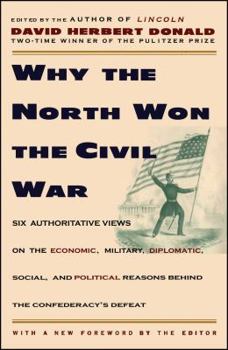Why the North Won the Civil War
Select Format
Select Condition 
Book Overview
In this classic exploration of the Confederacy's defeat in the Civil War, two-time Pulitzer Prize-winner David Herbert Donald and author of Lincoln assembles insightful and probing essays from six of America's most distinguished historians. Foc
Format:Paperback
Language:English
ISBN:0684825066
ISBN13:9780684825069
Release Date:November 1996
Publisher:Scribner Books Co
Length:128 Pages
Weight:0.29 lbs.
Dimensions:0.4" x 5.4" x 8.3"
Customer Reviews
5 ratings
Human nature determines history
Published by Thriftbooks.com User , 17 years ago
This is a short book consisting of five lectures. The civil war does not represent a subject of great interest to me. Americans, killing Americans is basically depressing. This book, though, I find fascinating. It is a concise examination of how organizations, the military, people, governments work. If you are a student of human nature, you will enjoy it. I continue to pick the book up, and will open to any page and reread passages that stimulate thought. For a civil war "buff", it will place you in deep waters illuminating why things turned out the way they did.
Read this one and get more on the subject
Published by Thriftbooks.com User , 20 years ago
Includes a Foreward by U. S. Grant III, retired Major General! That, and the 8-page "For Further Reading" chapter, alone, are worth the price of this book!I give this book five-stars for being thought-provoking on the general subject of reasons for a military victory ending in 1865, but it is only part of the story.For the rest of the story, be sure also to read such books as __The South Was Right__ by the Kennedy brothers, and of course __General Lee's Papers__ and Jefferson Davis' own __The Rise and Fall of the Confederate Government__. These latter two men were both active participants in the great drama -- there in person as eyewitness accounts -- and also give their reasons in answer to the same question of why the North won.
What might have been?
Published by Thriftbooks.com User , 21 years ago
It seems that much more attention is paid to debating the causes of the Civil War, but as this slim volume of essays reveals there are any number of varying and subtle arguments for explaining the outcome of the Civil War.It is probably the common view that the North winning the Civil War was inevitable, that the overwhelming preponderance of the North in terms of supplies, industrial infrastructure, and manpower ensured victory. Only one of these authors somewhat accepts the thesis of Northern material superiority. These authors are far more mindful of the fact that mismanagement or deep-seated flaws within the losing side of a conflict can be larger factors in the ultimate outcome than positive actions by the winning side. The authors all note some inherent advantages of the South: a need to only defend territory, the vastness of the South, a transportation network, the ability to produce large quantities of foodstuffs, a commodity, cotton, of great value in the international market, a huge labor force of three million slaves, and a certain psychological advantage in the defense of a way of life. But these authors discuss any number of factors that led, not necessarily inevitably, to the defeat of the South. The authors point mostly to both military and political malfeasance, as well as personalities and inherent characteristics of Southern society, as leading to defeat. The manner of financing of the War produced tremendous inflation; the supplies of cotton were mismanaged both as a source of revenue to fund the war effort and as a tool to force European nations to recognize the Confederacy; food supplies were confiscated at below market prices; and manpower was poorly utilized both in recruitment to the Southern army and in the deployment of labor on Southern farms. The states rights and independent political stance of Southerners seemed to prevent a coherent national posture being formulated in winning the Civil War. One of the authors points to the anti-statist views of all Southerners as interfering with producing a disciplined army. Southern units elected their superior officers and were disinclined to follow orders with which they disagreed. In contrast to this aggressive independence, some of the authors point to a general weakening of the Southern psychological state and even a "loss of nerve." The Confederate President, Jefferson Davis, is viewed by one author as a huge factor in the defeat of the South. Davis incompetently micromanaged the war effort, pursued flawed economic strategies, was personally difficult to engage, and exhibited an ineffectual indecisiveness and conservatism in times needing forceful and visionary actions. But the one-party system in the South prevented the rise of an effective opposition that could have addressed the original poor choice of President.Beyond any material advantage, the authors generally contend that Lincoln and Grant were trump cards for the North. Both were better suited to their jobs both in
modest size, MAXIMUM intellect
Published by Thriftbooks.com User , 21 years ago
Reissue of a classic collection of essays from the 60's...Currents's "God and the Strongest Battalions" is alone worth the price!...Economic, political, social, etc., aspects are all considering by the "big-gun" historians of 40 years past...Scholarly enough for the serious student, yet very reader-friendly for the novitiate...recommended in the strongest possible terms!
A must have for anyone writing a paper on the Civil War
Published by Thriftbooks.com User , 27 years ago
This is an excellent book which contains six essays on the various economic, miliary, diplomatic, social, and politiical reasons why the Confederacy lost and the Union won the Civil War. This book saved my butt






